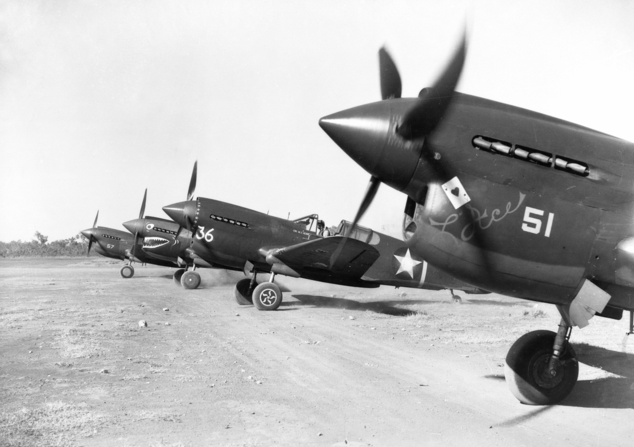The USAAF 49th Fighter Group over Darwin: a forgotten campaign
Posted By Brian Weston on September 6, 2017 @ 11:00

This year has seen many 75th anniversaries of battles and campaigns from the darkest hours of 1942, with the Battle of the Coral Sea (4 to 8 May) prominent. But in all these commemorative activities there has been no mention of the air campaign over Darwin conducted by the United States Army Air Forces (USAAF) 49th Fighter Group from March to September 1942.
The prelude to the campaign of the 49th Fighter Group covers some of the darkest days of the Pacific War: the fall of Singapore on 15 February; the bombing of Darwin on 19 February during which the Japanese shot down nine of the ten P-40s of Major Floyd Pell’s 33rd Pursuit Squadron; and the sinking of the USS Langley (CV-1) on 27 February, taking with it thirty-two P-40s and thirty-three pilots from the USAAF 13th Pursuit Squadron.
With the Netherlands East Indies and Philippines lost, American reinforcements, including three USAAF fighter groups—two with the Bell P-39 and one with the Curtis P-40E—were reconstituting in Australia. In March, the most advanced group, the 49th Fighter Group, commenced its move to the Top End, where US and Australian units were feverishly constructing airfields and associated facilities. By April, the 49th, under the command of Lieutenant Colonel Paul Wurtsmith, was in situ, with its three squadrons, the 9th, 8th and 7th, located at Livingstone, Strauss and Batchelor, respectively.
Wurtsmith was a career officer, specialising in ‘pursuit’ operations. He was a graduate of the USAAC Tactical School with 4,800 flying hours. His executive officer, Major Don Hutchinson, was another pursuit specialist with 2,500 flying hours. The 49th Fighter Group was fortunate to have such experienced leaders, plus a handful of veterans from the Philippines campaign, but that only masked the inexperience of the group, as out of its initial strength of 102 pilots, 95 had never flown the P-40 before.
Supported by the RAAF No. 5 Fighter Sector with its radars at Dripstone Caves (No. 31) and Point Charles (No. 105), and with the sector now including personnel from the USAAF 49th Fighter Interception Squadron, the 49th’s sixty P-40s provided Darwin with its only fighter defence from March to September 1942 against a threat mainly comprising fast and well-armed Mitsubishi G4M ‘Betty’ bombers escorted by Mitsubishi A6M ‘Zero’ fighters.
Darwin’s 3.7-inch anti-aircraft artillery forced the G4Ms to ingress at high levels—generally between 25,000 to 27,000 feet. Such a high ingress altitude sorely tested the P-40E fighters as their Allison V-1710 engines suffered from an inadequate mechanically driven supercharger. The Allison, while rugged and reliable, lost considerable power at the higher altitudes, with the operational ceiling of the P-40E limited to around 27,000 to 28,000 feet.
With time-to-height and operational ceiling limitations, Wurtsmith scrambled his squadrons in small manoeuvrable formations of four aircraft, with each flight leader listening to the No. 5 Fighter Sector broadcast. This ensured each raid was subject to multiple interceptions by flights of P-40s, which effectively tied the escorting Zeros to the bomber formation to ensure unchallenged flights of P-40s did not slip through to engage the G4Ms.
But with the intercepting P-40s unable to climb above the Zeros, Wurtsmith’s pilots remained at a tactical disadvantage as the escorting Zeros invariably dived down upon them. Acknowledging the threat posed by the higher and more maneuverable Zeros, Wurtsmith exhorted his pilots to avoid dogfighting and immediately disengage.
Over the period March to August 1942, Japanese records reveal nineteen Japanese aircraft were lost in the raids on Darwin. Losses comprised one reconnaissance aircraft, seven fighters and twelve bombers, plus several more damaged. In turn, the 49th Fighter Group lost nineteen fighters, including four pilots, with another eight pilots lost in non-combat-related accidents.
Given the limitations of the P-40E as a high-altitude interceptor, and the low experience level of the bulk of the USAAF pilots, the 49th Fighter Group can rightly claim to have done its job well. But in August, with the Japanese diverting their air forces to the Guadalcanal campaign, the Darwin campaign tailed off and the 49th Fighter Group commenced their move to Papua and New Guinea. The air defence of Darwin was passed to No. 77 Squadron, which moved to Batchelor in August, and No. 76 Squadron which, having returned from Milne Bay, moved to Strauss in October.
As for Paul Wurtsmith, he continued to serve with distinction in the South West Pacific. As a brigadier general, he commanded V Fighter Command in 5th Air Force, and then as a major general commanded 13th Air Force. His contribution, and that of the USAAF 49th Fighter Group and supporting units, deserve far greater recognition than they have received.
This piece was originally published in the September issue of Australian Aviation. It has been largely sourced from the paper ‘Darwin 1942: the missing year’ [1] by Anthony Cooper.
Article printed from The Strategist: https://aspistrategist.ru
URL to article: /usaaf-49th-fighter-group-darwin-forgotten-campaign/
URLs in this post:
[1] ‘Darwin 1942: the missing year’: http://www.territoryremembers.nt.gov.au/sites/default/files/uploads/documents/collection%20of%20stories/anthony_cooper.pdf
Click here to print.